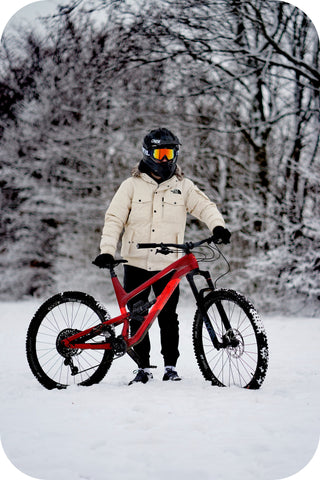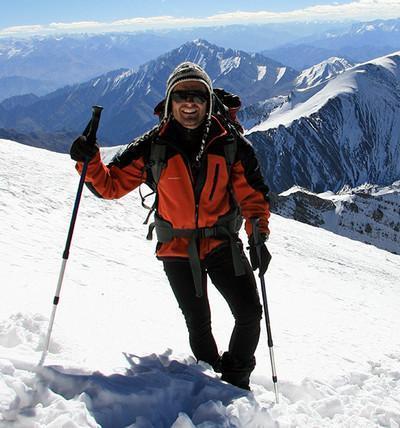Head protection is always something that people need to worry about, especially when you are engaged in any extreme sport. Proper head protection is crucial for not only you but also for your safety.
A bike helmet can be used in skiing as long as it is certified for both biking and skiing. The helmet should be certified on impact protection as well as on the inside. The inside of the helmet should also be warm enough to prevent the head from getting cold, its not all about cool painted graphics ya know!
Now that you have the information you need, you can start shopping for a helmet that will keep you safe both on the slopes and on the road.
Skiing Wearing a Bike Helmet... Really?
-
In a Society Where Bike Helmets are Almost Mandatory, Why do You Need a Ski Helmet?

When you buy a ski helmet make sure that the size of the helmet is suitable. Check the straps of the helmet. Make sure that they are not too loose. If you feel that the helmet is not giving you adequate protection, replace it with a new one. You should wear a helmet for every kind of skiing. You may not be aware of this fact but, the helmet for skiing also has some other benefits. The helmet reduces the wind resistance. It also protects your ears from the cold.
-
True or False? You Can Ski While Wearing a Bicycle Helmet.
True, you can ski while wearing a bike helmet. Many people around the world use bike helmets while skiing. Many of them even wear helmets that do not comply with the safety standards for skiing helmets. This is because biking helmets are designed to protect the head from violent knocks, which are not quite the same as the light impacts that are experienced during skiing. But, helmets that are designed for winter sports come with a hard shell and can withstand the impacts that are experienced on the snow.
-
Are Helmets Mandatory for Skiing?
While helmets are not mandatory for skiing in the U.S., they are in most other countries. Most ski resorts require helmets to be worn by all skiers and snowboarders. Some resorts will even offer discounts to people who choose to wear helmets. Some ski resorts require helmets for children under the age of 18 to be worn. This rule is designed to protect children and teenagers from head injuries. Wearing a ski helmet while skiing or snowboarding will go a long way towards preventing head injuries.
Skiing and snowboarding can be very fun and exciting, but they can also be dangerous. You always risk getting hurt if you ski or snowboard. A head injury can cause serious complications. It is important to wear a helmet while skiing or snowboarding for protection against head injuries. Most ski resorts will not allow you to ski or snowboard if you are not wearing a helmet. In some areas, helmets are required by law. If you choose to wear a helmet while skiing or snowboarding, you can rest assured that you will be protected against head injuries.
-
How to Choose the Right Helmet for You and Your Needs.
When it comes to choosing a helmet, there is a lot more to it than just picking the most visually appealing helmet from the rack. You need to ensure that it fits you properly, that it’s comfortable, and that it offers you the best protection while you’re cycling. Ski & bike helmets are made to protect your head in a variety of different ways. The most important thing to remember when choosing a helmet is that you have to wear it. The right helmet for you is the one that you will wear every time you ride or ski.
-
How to Know if Your Helmet Needs Replacing?
Ski helmets are designed to absorb as much impact as possible when you fall. They are made of a hard outer shell and an inner liner filled with a deformable foam. You should replace your ski helmet if you experience any of the following problems: The foam has become hard and less shock absorbent. It is torn. It has visible damage to the outer shell. The helmet is more than 5 years old.
Replace your helmet if you have not used it for several seasons or if you have not stored it in a cool, dry place. The nylon shell can deteriorate from exposure to sunlight, which can then degrade the shell's ability to protect you in the event of a crash. The shell is the most important part of a ski helmet. It has a rigid outer shell and a thick, cushioned liner. The shell is designed to distribute the force of an impact across the entire helmet, while the liner is designed to cradle your head and absorb any shock that may be transmitted to it.
Conclusion

When you're looking for a helmet to use for skiing, you'll find that there are a number of different types of helmets to choose from. In general, helmets that are designed for skiing tend to have a few common features. They're a bit more compact than bike helmets, and they are designed to be more aerodynamic, as speed is an important factor in skiing.
These helmets also tend to have more coverage around the back of the head, to protect it from too-close encounters with tree branches and other objects. But most importantly, you'll want to make sure that you wear your helmet correctly and that the helmet fits you properly. If you're looking for a helmet to wear for both skiing and biking, you'll have to make sure that the helmet can be adjusted to fit you properly for both activities. Some helmets can be adjusted in a way that allows you to wear the same helmet for both activities, but these helmets tend to be more expensive.
Frequently Asked Questions, Answered
-
Why do you prefer to wear a helmet while skiing?
A helmet can help reduce your risk of a concussion by 83%. This is the main reason why I ski with a helmet. Skiing is a sport, in which the head is most vulnerable of getting injured. In fact, for every 100 people who die from skiing, 32 of them died as a result of head injury. Wearing a helmet is a must if you value your head. A helmet is not only meant for protecting your head from a hard impact. It also absorbs the energy from a fall which can reduce the overall damage in a fall.
-
Do you think skiing with a helmet is necessary?
-
How often do you replace your helmet?

-
Where can you buy the best helmet for skiing?
It is best to buy a helmet from a reputable retailer either offline or online. We only sell high quality helmets here at Cheap Snow Gear, so check out our great products online for some amazing deals and if you have any questions or queries about them please drop us a message.
-
Do ski helmets save lives?
Ski helmets do save lives. They have made skiing safer. According to National Ski Areas Association, in areas where helmets are required by law, over 85% of skiers and snowboarders wear helmets. In areas where helmets are not required, less than 50% of skiers and snowboarders wear helmets. According to Colorado Ski Country USA, "Research on helmet use in skiing has proven that your odds of surviving a head injury are significantly better if you wear a helmet. Ski helmets can reduce the risk of head injury by 88% and brain injury by 75% when compared to not wearing a helmet." So, yes, ski helmets do save lives.
-
Would you recommend wearing a helmet for skiing to your friends?
I had a friend who was a medical student. He led a very busy life, which wasn't helped by him being in a long term relationship. He ended up getting a super bad ear infection, and had to take a week off his job to rest at home. His girlfriend was worried about him missing work and school, and so she made him go to the doctor and get some antibiotics. She also insisted that he wear a helmet when he went skiing that weekend, as he had told her he was going to.
He reluctantly did so, and ended up having a serious accident when he fell trying to do a trick. He hit his head on a rock, and ended up being in a coma for a week. He was lucky to live to tell the tale, but it was a lesson he would never forget. He told me that he had been in a few brawls before, but he never realized how dangerous the head really was. He has never forgotten the ordeal, and has always made sure to wear his helmet when skiing or snowboarding ever since. In my opinion, wearing a helmet is not an option while skiing but a necessity.
ABOUT THE AUTHOR
Olivia Poglianich
Content Strategist
Olivia Poglianich is a nomadic brand strategist and copywriter in the ski and snowboard space who has worked with brands such as Visa, Disney and Grey Goose. Her writing has taken her all over the world, from a Serbian music festival to a Malaysian art and culture event. Olivia is a graduate of Cornell University and is often writing or reading about travel, hospitality, the start-up ecosystem or career coaching. Her latest interests are at the intersection of web3 and communal living, both on and offline.






